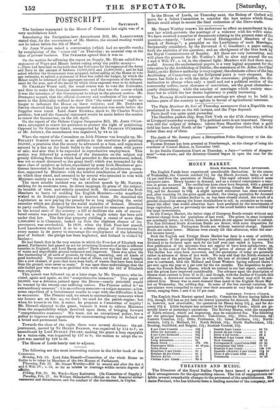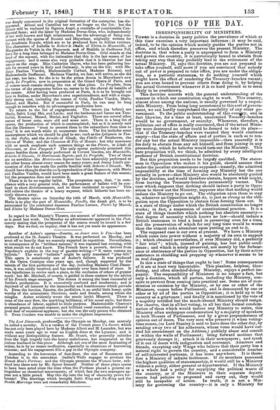THEATRES AND MUSIC.
The Directors of the Royal Italian Opera have issued a prospectus of their arrangements for the approaching season. The list of engagements ex- hibits several remarkable changes in the personnel of the establishment. Ma dame Persiani, who has hitherto been a leading member of the company, and was deeply concerned in the original formation of the enterprise, has dis- appeared. Alboni and Castellan too are no longer on the list: but the former will be replaced by Signora Angri, a contralto of considerable Con- tinental fame; and the latter by Madame Dorus-Gras, who, independently of her well-known and high attainments, has the advantage of being con- versant with the operas of Rossini and Meyerbeer, originally written for the Academie Royale, which are to be produced here in Italian versions. The characters of Isabella in Robert is Diable, of Elvira in Masaniello, of Marguerite de Valois in the Huguenots, and of Matilda in Guillaume Tell, have for a long time belonged to Madame Dorus-Gras. Grisi stands at the head of the soprani, with the intimation that this is the last season of her engagement; and it seems also very probable that it is likewise her last season on the stage. Miss Catherine Hayes, who has been gathering lau- rels for several years in Italy and Germany, is also on the list; with Ma- dame Pauline Viardot, Mademoiselle Corbari, Madame Romani, and Mademoiselle Steffanoni. Madame Viardot, we fear, will arrive, as she did last year, too late; for she is to be the prima donna in Meyerbeees new opera, Le Prophite, now in preparation at the Grand Opera of Paris, and of course must remain during the run of that piece. Le Prophite, from the terms of the prospectus before us, seems to be the cheval de bataille of the season. After having been produced at Paris, it is to be brought out here in Italian, under Meyerbeer's own superintendence, and with a singu- larly strong cast, including the names of Grisi, Pauline Viardot, Mario, Massol, and Marini. But if successful in Paris, its run may be long enough to interfere with its advantageous production here. To return to the list of engagements. The tenors (as before) are Mario, Salvi, Luigi Mei, and Lavia; and the baritones and basses are Tam- burini, Ronconi, Massol, Marini, and Tagliafico. There are several other names of lesser note, some old and some new. There is a long list of operas, the production of which is contemplated; but as it is merely said that the Directors " trust to present them to the subscribers from time to time," it is not worth while to enumerate them. The list includes some masterpieces which we should be glad to see; such as the Iphigenia in Ma- ris, the Orfeo, and the Armida of Gluck, the Fidelio of Beethoven, the Oberon of Weber, and the Clemenza di Tito of Mozart: but why announce with so much emphasis such common things as the Pirata, or Linda di Chamouni, or Don Pasquale f The only operas positively promised this season besides those already performed at Covent Garden, are Masaniello, Roberto it Diavolo, Il Matrimonio Segreto, and Le Prophite. Two of these are no novelties: the Matrimonio Segreto has been admirably performed at the other house almost every season for many years; and Jenny Lind's per- sonation of Alice has made the public familiar with Roberto it Diavolo. We should have thought that the early reproduction of the Huguenots, with Mario and Pauline Viardot, would have been made a great feature of this season; but the prospectus does not mention it.
There is to be no regular ballet. The prospectus says, that, " in com- pliance with a very general wish, the performance of ballets will be con- fined to short divertissements, and to those incidental to operas." This will relieve the theatre of a heavy expense, which hitherto has been en- tirely thrown away. The theatre opens on Saturday the 10th of March, with Masaniello. Mario is to play the part of Masaniello; Fenella, the dumb girl, is to be personated by the celebrated danseuse Pauline Leroux, Pietro by Massol, and Elvira by Madame Dorus-Gras.























 Previous page
Previous page